What to Feed Ducks and Ducklings
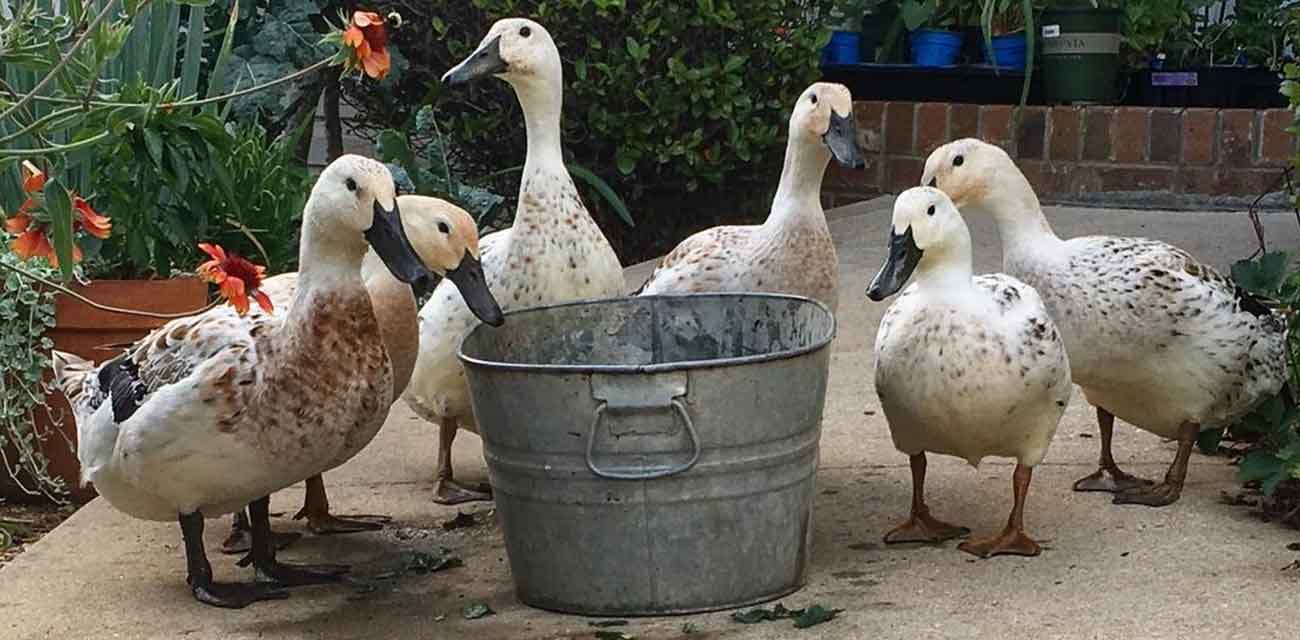
Tyrant Farms' articles are created by real people with real experience. Our articles are free and supported by readers like you, which is why there are ads on our site. Please consider buying (or gifting) our books about raising ducks and raising geese. Also, when you buy through links on our site, we may earn an affiliate commission. Learn more
Want organic duck eggs from your backyard flock? Then you’ll need to know where to buy organic duck and duckling feed.
We may have the most spoiled-rotten flock of ducks on the planet. Our Welsh Harlequins have two humans that dote on their every need, including tucking them into their coop at night, building them a 1,200 gallon in-ground pool with waterfalls, tending entire garden beds to grow them their favorite duck veggies, and ensuring that their food bowls always overfloweth.

In all fairness, the relationship isn’t totally one-sided. Our ducks give us duck eggs, added soil fertility, pest insect control, and limitless amounts of entertainment in return. (Ducks are goofy and hilarious creatures.)
If you have backyard ducks, or are considering getting ducklings, you’ll need to know what to feed them. And you’re in the right place, because we’re going to share everything you need to know about feeding your ducks–whether duckling or adult, whether they’re laying eggs or not.
Duck nutrition: what & when to feed your ducks
As with humans, a good diet is critically important to the health of your ducks.

Here are some important things you need to know about ducks in order to make sure you’re getting your ducks the nutrition they need to be healthy:
1. Ducks have different dietary needs than chickens.
As waterfowl, ducks have different dietary needs than their feathered land-dwelling cousins. Ducks can do just fine on a chicken feed base, but you’d need to make some modifications like adding Niacin (Vitamin B3) to their feed.
Instead, we simply recommend getting duck feed that’s been specifically formulated for ducks.
2. Ducks’ nutritional requirements vary at different life stages and based on their sex.
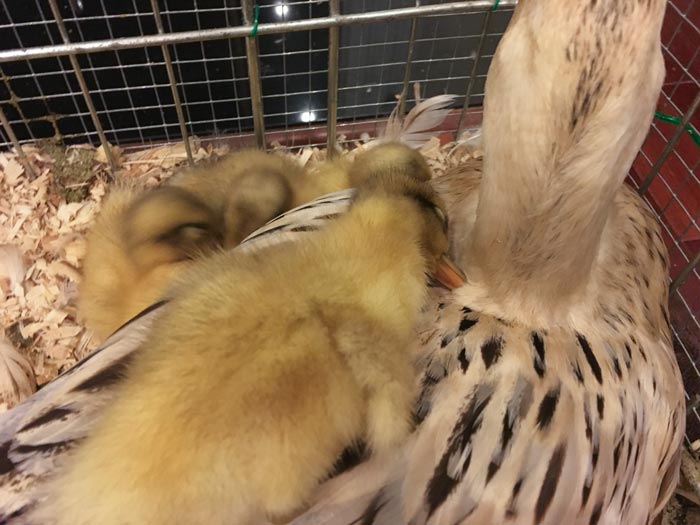
There are three distinct types of duck food & supplementation you’ll need for your flock depending on their sex (male or female) and life stage (scroll to the bottom for a handy chart):
- starter feed – 0-8 weeks
- maintainer feed – for drakes (male ducks) or non-laying female ducks 8+ weeks or older
- layer feed – for laying ducks
Now, let’s jump into the details of each one…
STAGE 1: DUCK STARTER FEED (0-8 weeks)
Ducklings require higher levels of protein the first few weeks of life:
- 0-2 weeks – 18-20% protein;
- 3 weeks – at 3 weeks old we bump the protein levels of our duckling food down to 15-16% by mixing in 20% oats to their crumble.
Lowering a duckling’s protein intake at week 3 encourages them to grow at a healthy, normal rate vs. the more accelerated rate commonly recommended for broilers & commercial egg layers (as per duck expert, Dave Holderread, in Storay’s Guide To Raising Ducks). Also note that sustained higher levels of protein can cause leg and wing deformities in addition to causing kidney and liver damage.
If you’re like us, your ducks are as much pets/family members as they are production animals, so you want them to be as healthy as possible for as long a life as possible. The goal is NOT to make them as big as possible as fast as possible or to lay as many eggs as possible.
A FEW IMPORTANT THINGS TO NOTE ABOUT STAGE 1:
Note 1: Niacin (Vitamin B3)
It’s very important that either: a) your ducklings get duckling-specific starter food (not for chickens), or b) if you buy starter meant for chicks that you enrich it with niacin, which is really easy to do.
Because ducklings grow faster than chicks, chick starter does not have the niacin levels that are optimal for ducklings. NRC requirements for ducklings = 55 mg/kg niacin compared to only 27-35 mg/kg for chicks.
If ducklings don’t have the nutrition to support proper bone and muscle development (such as not enough niacin), they could end up with leg deformities and other lifelong health problems.
Here’s an AWESOME article by Metzer farms about duckling leg problems & Vitamin B-Complex supplementation with measurements and calculations for adding it to their food or water. We typically add 2 tablespoons brewers yeast per cup of crumble or 100mg B-Complex/gallon water. You can order either form of Niacin easily via Amazon:
All of our ducklings loved brewers yeast and, even though we bought duckling-specific starter, we’d still sprinkle some Brewers Yeast in with their veggie treats (kale, tomatoes, etc.) just because they enjoyed it. Also, if your ducklings are eating a lot of nutrient-dense organic veggies like kale, niacin deficiency isn’t as much of a concern.
We’ve also found that Brewers Yeast sprinkled on kale with a bit of olive oil, lemon or lime juice, & salt makes an incredibly tasty snack for us humans! Why should our birds get to eat all the good stuff?!

Note 2: Ducklings choke on dry crumble.
Ducklings constantly eat, and each time they do you’d think they’d never seen food before. They voraciously wolf their food down and often times will choke on the dry crumble.
Pro tip: Stir in enough water to their crumble to make a wet mash (the consistency of oatmeal). This also helps ensure an even mixture of brewer’s yeast if you’re adding niacin to their food.
Note 3: Don’t use medicated feed.
If you’re reading an article about where to buy organic duck food, you’re probably not going to feed your ducklings medicated chick starter. BUT just in case, I’m going to say it: Don’t feed your ducklings medicated chick starter.
Ducklings eat more food than chicks of the same weight and can consume higher levels of the antibiotic than is safe for them. Additionally, many of the bacterial infections that chicks get, ducklings aren’t susceptible to so there’s no reason to medicate them.
In fact, that’s another reason we love ducks: in our humid/wet climate, they’re much less susceptible to diseases and illness than chickens are.
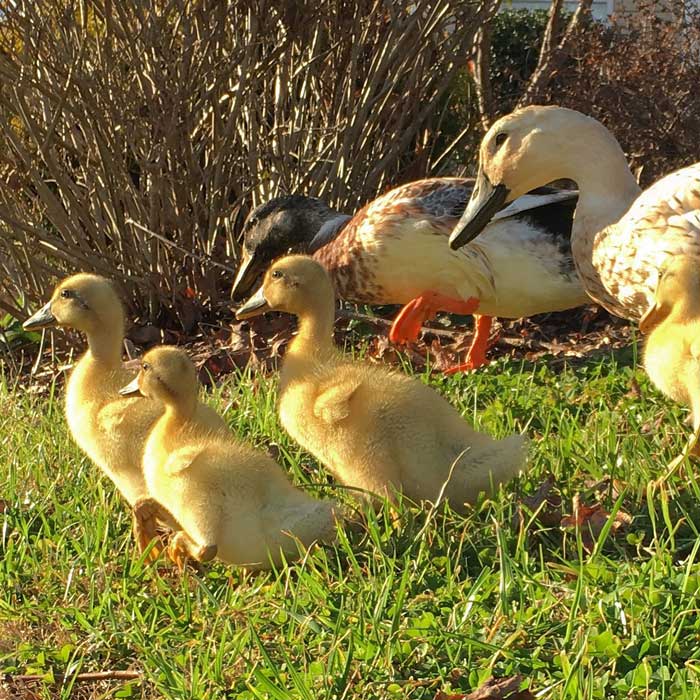
STAGE 2: MAINTAINER FEED (8+ weeks & non-laying birds)
When your adolescent & adult female ducks (hens) aren’t laying, they’ll need “maintainer” duck food (13-15% protein). Your adult males (drakes) will need maintainer from 8 weeks on.
STAGE 3: LAYER FEED (mature egg-laying hens)
When your hens start laying, make sure they start getting duck-specific *layer feed (16-17% protein, 2.5-3% calcium). Layer duck feed has more protein, calcium, and other vitamins & minerals in it than maintainer feed. This extra nutrition is critical to the health of a laying hen.
*Again, in our opinion, your goal should be to grow healthy ducks, not to produce the most possible eggs from each hen. Giving your laying hens 100% layer feed can cause them to lay too frequently over a longer period of time than is good for their health. Issues arising from over-active reproductive tracts are likely one of the leading causes of death and illness in backyard ducks.

Layer & Maintainer feed combo for optimal health
We recommend mixing maintainer and layer while your ducks are laying, giving them the nutrition they need without stimulating them to over-produce eggs. It may take some playing around with the formula to see what ratio of layer:non-layer feed works best for your flock.
We usually start with a mix of 30% layer feed : 70% maintenance feed and increase (or decrease) the percentage of layer in the mix as needed. Hens who aren’t getting enough calcium will lay eggs with thin shells and soft-shelled eggs.
If you see thin/soft egg shells, the laying duck is likely nutritionally depleted and needs to stop laying. Here’s a really handy egg shell trouble-shooting chart.
Storay’s Guide To Raising Ducks recommends that you start your mature ducks on layer feed three weeks prior to them actually laying eggs. How do you know when your ducks are going to start laying? Here’s how we do it.
Sound too complicated? Another option is to just have a bowl of loose calcium available for your ducks, such as pulverized oyster shell (that’s a link to the only brand we can get our very picky ducks to eat). This allows them to take in additional calcium as they feel their bodies need it.
You can then immediately switch to layer feed the day the first egg arrives. It’s also important to remember to switch them back to maintenance (non-layer) feed once they stop laying to make sure they’re not getting too much calcium and protein, which can cause health problems.
If you’re curious about mineral breakdown and other more in-depth info about duck food than we can cover here, Metzer Farms has a helpful chart.

July 2019 update: Maintainer feed only?
Ok, not to complicate things too much, but… After multiple, long conversations with our avian vet, Dr. Hurlbert at HealthPointe Veterinary Clinic, about ideal nutrition and duck feed for laying ducks, we wanted to update this section with another possible duck feed regimen.
Dr. Hurlbert sees LOTS of egg-laying ducks as patients who are getting quality layer feed, but who are still having reproductive health problems such as soft eggs, egg binding, etc. In her opinion, she thinks duck pet owners who care more about their ducks’ health than the quantity of eggs they lay should do the following:
- use maintainer feed even when your ducks are laying eggs;
- always make a calcium supplement like oyster shell available so your girls can get as much calcium as they need when/if they need it;
- only mix in layer feed if you notice the egg shells becoming less calcified or your ducks lay soft eggs (ratio 25-50% layer feed: 75-50% maintainer feed);
- continue to let your ducks forage and offer them other treats like greens, tomatoes, etc as you see fit.
Under this feed regimen, your ducks are likely to lay fewer eggs each year, but have fewer health problems and live longer, healthier lives.
Visualize a seesaw: on one side of the seesaw is duck health and longevity; on the other side is a pile of duck eggs. Which side of the seesaw do you value most?
Best available duck feed (including where to buy organic duck feed)
We’ve read about and used lots of different types of duck feed. We also talk regularly with avian vets and other experts who know a lot about duck health and nutrition.
Here’s a list of duck food brands we recommend:
McGeary Organics (mash & pellets)
USDA Certified Organic. We started and raised our flock on McGeary and have loved it each time.
A complicated illness in our flock (unrelated to feed) led us to follow our vet’s advice and switch to Mazuri Waterfowl for our adult birds. We still use McGeary any time we raise ducklings.
Feed types available:
- Waterfowl starter
- Waterfowl maintenance
- Waterfowl breeder (layer)
Scratch and Peck Feed (whole grains)
USDA Certified Organic. Scratch & Peck’s whole line of feed is excellent in terms of quality and we found their customer service to be top notch (the one time we needed to use it), but we offer some words of caution: If you’ve never fed a whole grain feed before, make sure you keep an eye on your ducks to ensure they’re eating *everything*, not just the grains or corn.
Some of our hens picked out what they enjoyed eating and left the nutritious things (like the minerals and other fines that are separate in a non-pelleted feed product) in the bowl and weren’t getting a balanced diet. They also didn’t like to eat fermented food (which is the recommended way to offer whole grain feed for the most bio-available nutrition – more on that below), and if it’s not mixed with water it allows your birds the opportunity to be picky eaters.
If you’re looking for a high-quality whole grain, fermentable organic duck feed, Scratch & Peck has it. It’s a bit more expensive if you can’t find it locally, but you get what you pay for.
Feed types available:
- Chicken starter (you’ll want to add Niacin/B-Complex vitamins to this starter, as mentioned above)
- Chicken maintenance
- Chicken layer
Mazuri Waterfowl (pellets)
NOT CERTIFIED ORGANIC, but it’s being added to this list b/c it’s recommended by literally EVERY waterfowl rescue, zoo, and vet we’ve spoken to – including our own. You’re guaranteed to get great waterfowl-specific nutrition and not have to worry about your ducks picking out the pieces they like and leaving other things they actually need in the bowl.
If certified organic food and organic eggs aren’t as important to you as making sure your ducks are healthy, we’d recommend this brand.
Feed types available:
- Waterfowl starter
- Waterfowl maintenance
- Waterfowl breeder (layer)
Mixing your own duck feed
Sometime it’s practical to mix your own duck feed using multiple brands (or life stage-specific types) of feed. This really comes in handy when you have a 10 lb bag of starter and you want to use it up, but you don’t want to feed your birds that much protein, so you mix it with another bag of feed.
Because feed mixing errors can cause all kinds of health issues, you’ll want to make sure you are using proper ratios and your birds are getting the proper nutrition they need to be healthy. Metzer Farm’s has a very helpful calculator to make sure you’re mixing things in proper ratios.

Sprouting grains & fermenting feed for ducks
Sprouted and fermented grains are excellent for your duck’s health, providing lots of nutrition and promoting beneficial microbes within their digestive systems. Do you have to feed your ducks sprouted grains and fermented feed? Nope. But it can improve their health, even if you just give it to them once per month or so.
Also, the healthier your ducks, the more nutritious their eggs will be!
Here are three excellent sources to help you learn more about using these supplemental fermented foods for your ducks:
- Scratch & Peck’s Guide to Lacto-fermenting Feed
- Chicken Chick, How to Sprout Grains
- Fermenting Feed FAQs: Especially helpful if you opt for a whole grain feed like Scratch n’ Peck from the list above

Treats & poisonous plants
Ducks LOVE treats. But make them healthy treats!
If you’re a regular Tyrant Farms reader, you know we’re avid organic gardeners – so, it only makes sense that we garden for our ducks as well! Be sure to check out our post: Top 10 Garden Plants to Grow for Ducks & Chickens.
Say NO to bread, as this can become a gelatinous blob in their crops and cause all kinds of digestive problems. On that note, if you absolutely feel compelled to feed wild ducks at a nearby lake or pond, use cat or dog food kibbles, NOT bread. Or better yet, if you don’t have duck food, don’t feed them at all.
Our ducks absolute favorite treats in the summer are fresh-picked tomatoes.
In the cool months, they gorge on virtually every type of salad green we grow in our organic garden.
To help you figure out what treats to give your ducks and what plants/foods to make sure they avoid, here are two good resources:
- Ultimate Duck Treat List: Long list of duck-safe treats ranked by how much ducks typically love them.
- Poisonous Plants: Forum discussion with links to quite a few duck-safe and poisonous plants.

[divider top=”no” style=”double”]
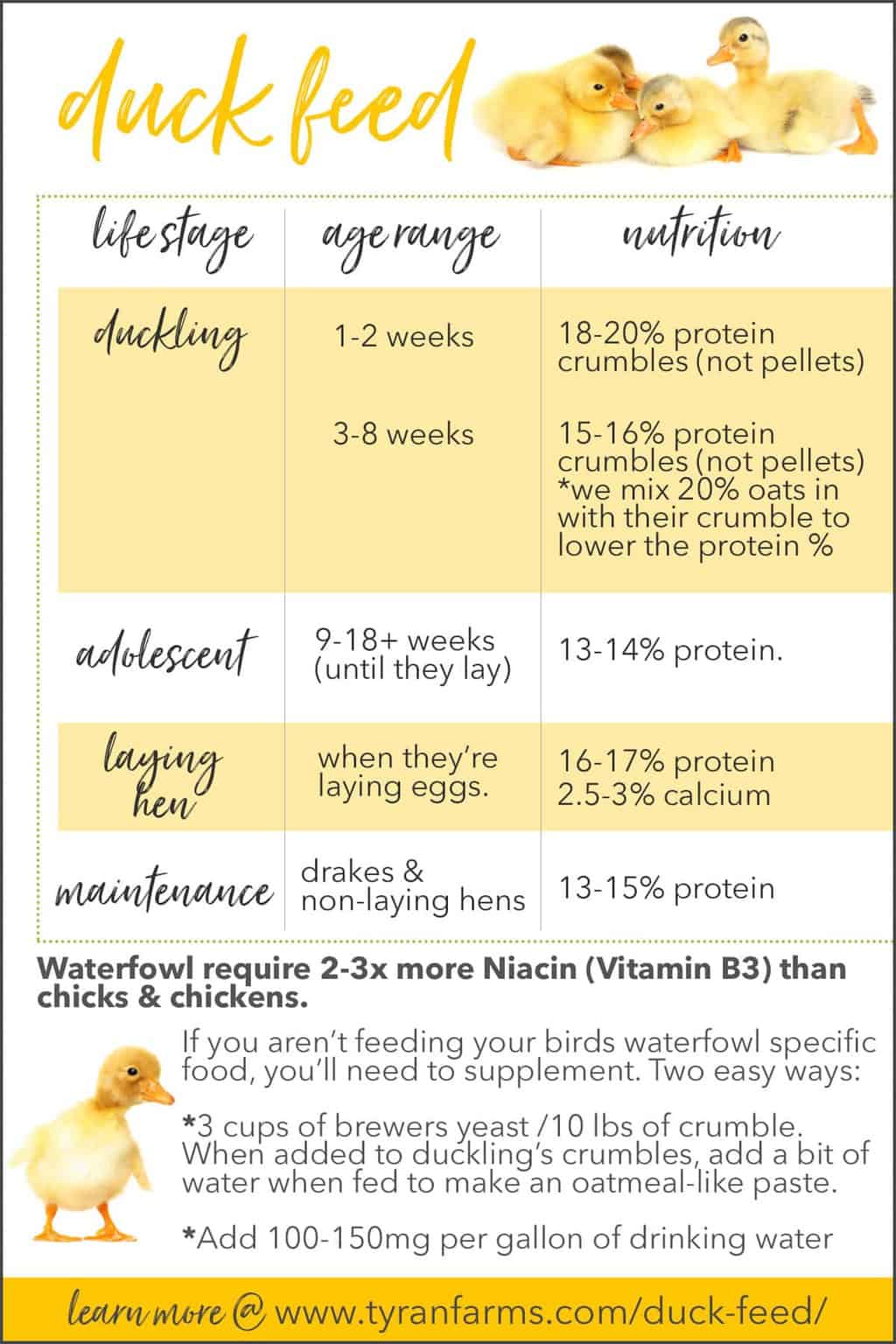
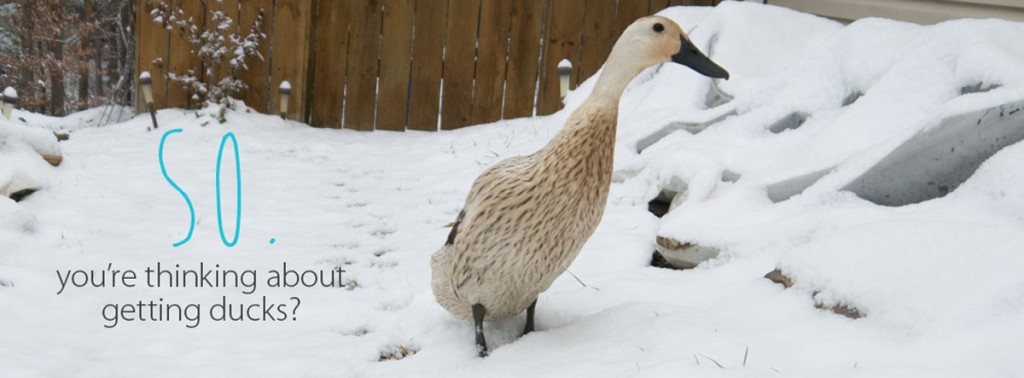
…And be sure to check out our other articles about raising pet and backyard ducks!



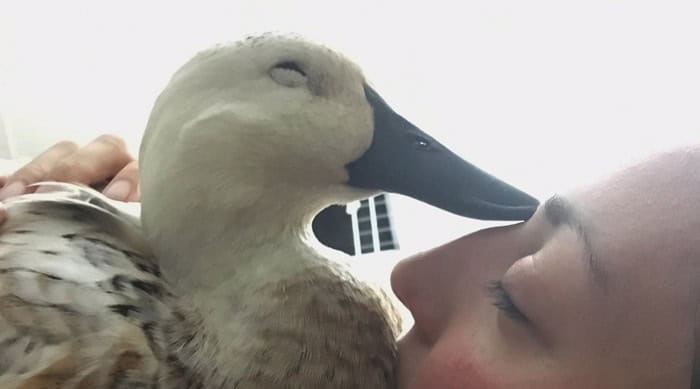
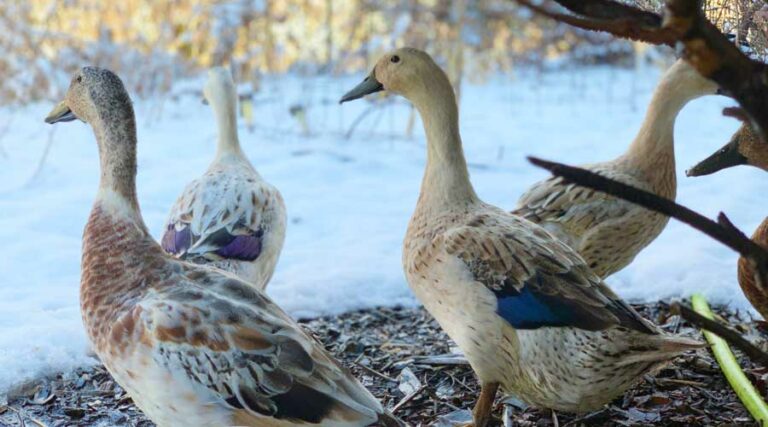
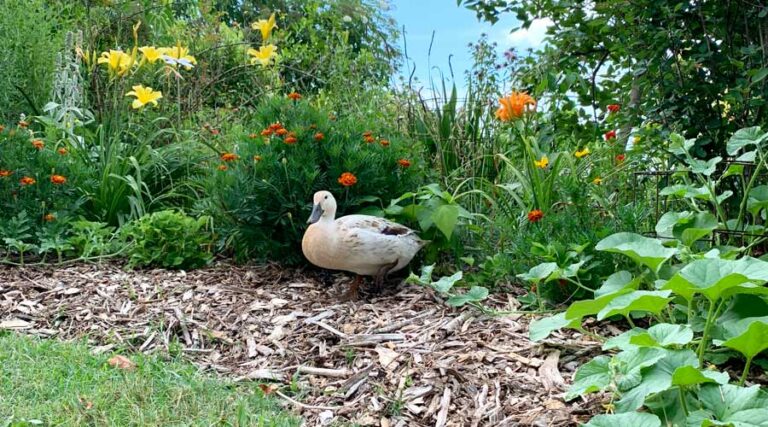
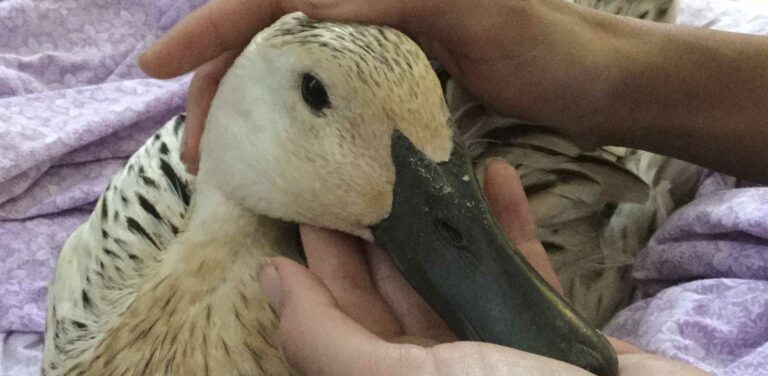
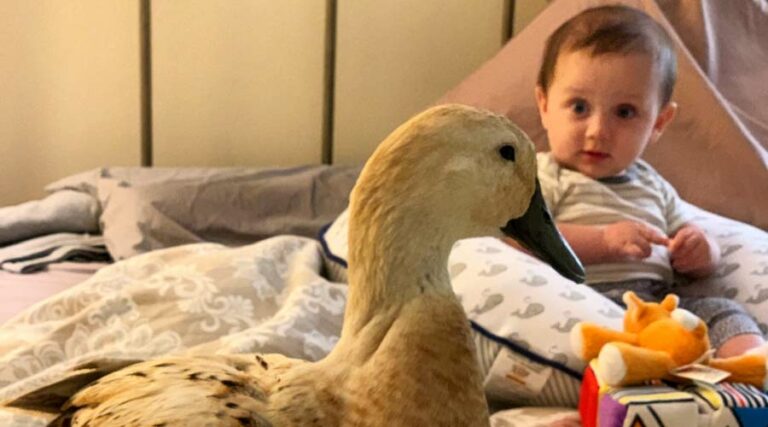
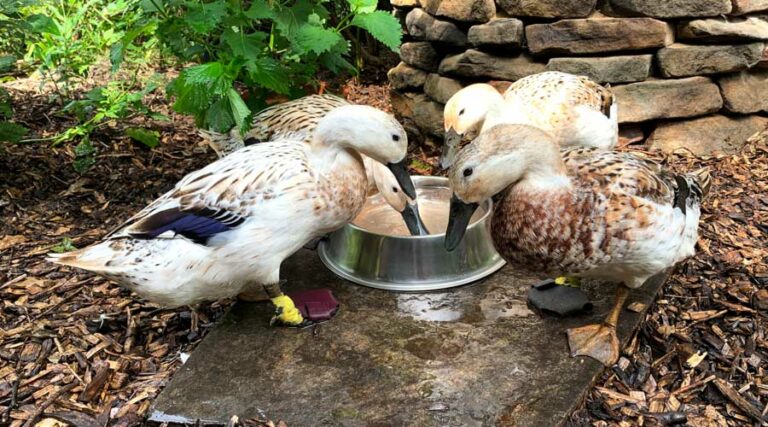
We’re getting ready for our first ducks this spring—thank you for all the information! Do you have a recommended feed during their “adolescent” stage?
Hi Jeanne! Glad to hear you’re getting ready for ducks in advance of the big day! We have a detailed “How to raise ducklings” guide which includes duckling dietary recommendations here: https://www.tyrantfarms.com/how-to-raise-ducklings-a-step-by-step-guide/. We’d highly suggest you read through that info, as it will (hopefully) answer all your questions. If not, please let us know and we’ll be happy to help.
Hey there! I’m wondering what the best feed would be for my three call duck pets. I was using mazuri waterfowl, but one of my girls literally almost choked on it today and scared me pretty badly. She couldn’t get it down her throat so I immediately took the food out and vowed to never again let them try to swallow the pellets whole.
I usually crush it for them since I know it’s very nutritious and one of the best duck feeds out there, but I fear it’s too dusty to be safe because they may inhale it often. So I’m looking for an alternative. Do you have any advice? Thank you! 🙂
Hi Elizabeth! Since Mazuri waterfowl feed is a great feed, a couple of options there:
a) you could put the feed in water when you give it to them so the pellets go down their throats easier (the pellets are actually designed to float and that’s how zoos often feed waterfowl);
b) you could pulverize the pellets and add enough water to a serving to reach a porridge-like consistency and give that to your call ducks.
If you’re planning to switch to a crumble feed, those are pretty dusty in texture as well. You’ll notice your ducks doing a bit of gagging after each bite. So, you’d probably want to add water to the crumble to bring it to porridge consistency. But at that point, you could have just as easily have done the same thing with your pulverized Mazuri kibble. 😛
Hope this input helps and best of luck to you and your flock!
Hi there, thank you Aaron!
I’m thinking I may try the mazuri pellets with water. In this case, would you recommend offering the water+pellets 2 times daily, maybe in the morning and afternoon?
Hi Aaron!
Thank you for all the great info! We are certainly learning as we go. We rescued 3 baby mallards almost 2 weeks ago (we’re in New Zealand so it’s spring here). I think they were only a day or two old when we found them (they were 32 grams). We’ve had them inside and are feeding them chick starter with added brewers yeast and adding water to keep it quite soupy. Now that we think they are about 2 weeks old, should we stop adding water to the chick starter? If so, should we do that slowly and make the food thicker and thicker until it’s dry? Thank you!
Hi Autumn! First, thanks for rescuing the ducklings and for taking such good care of them. There are two reasons to add water to the crumble:
1) to help keep the ducklings from gagging and choking due to its dry, powdery texture; and
2) to help mix in the nutritional yeast/niacin.
You can reduce the ratio of water you add to the crumble, but you’ll probably want to keep adding some water to the crumble for a few more weeks, as per our guide in this article. Or if you decide to go ahead and switch to non-watered crumble, just make sure there’s a bowl of water close by for them to access and keep a close eye initially to see if it looks like they’re having any trouble swallowing it. Best of luck to you and your ducklings!
Thank you so much for this article. I’ve read it several times since getting ducklings in May and really appreciate your focus on duck well being over egg production (Storys guide just grossed me out, being all about meat and eggs). We gave them Scratch and Peck starter with tons of extra nutritional yeast (our young drake grew much faster than the girls and got wobbly legs – took 20 days of Durvet vitamin B complex daily, but the shakes are almost entirely gone now). About a week ago we switched to Scratch and Peck grower, mixing in some oats to lower the protein. Problem is, they don’t like it. Everyday I’m doing all I can to try to coax my ducks to eat even just a little duck food. All they want to do is forage (or be hand fed fresh kale all day).
The switch to the grower feed and more foraging freedom took place at the same time and I think they discovered that they just like slugs and such more than duck food. They are about 8 weeks old. Quality duck food is expensive, so I’d hate to waste the Scratch and Peck, but do I need to just try a different brand? Is there anything that would entice them to eat a feed that they don’t love?
Also, once they are foraging, how much duck feed should they be eating each day? I can find so much information about the recommended nutritional breakdown of the feed, but nothing about how much feed they need.
Thank you so much for any guidance!
Thank you for the excellent article and, for that matter, all of your articles/blog – your content is a go-to resource for us as we start our duck journey (including pond creation). Regarding your recommendation for starter duck feed – I take McGreary’s offering to be your preference; would you mind confirming that the Virtuous line is what you use?
Hi Kevin! Thanks for the kind words and glad to hear our articles have been helpful for you. Yes, you are correct: any time we raise ducklings, we start them on McGeary. If I’m not mistaken, McGeary is no longer certified organic, but they still source and operate the same way, they just don’t get certified. Since this article was originally written, they’ve also added “Virtuous” to their product branding. Sorry for any confusion. Let us know if you have any other questions as you move along.
I have a unique story and I was hoping you could help me. So I work at a hospital and a wild duck had her babies in one of our courtyards. Very safe, but no water and no way out. (except flying of course) Skip ahead, the mom stayed and raised the one baby that survived for the first two or so weeks but ultimately left to go make another batch. This is where I came in. I found your site, this page in particular, and sprung into action. I fed her baby duck crumble and now shes 2-3 months old (I wasn’t keeping track) Her wings have that blue stripe in them so are her wings grown enough to fly? My worries are, will she still fly with no one to teach her? I’ve seen her trying, but i’m a first time mother, so I don’t know what to expect. What if she never flies? She’s all alone. Her mother did raise her to be afraid of humans so i’m not worried about her being too domesticated, but I want her to be free and happy with a much bigger water source.
Also, flaky duck mom? Had her second brood in the other courtyard with no water and no way out. I wasn’t ready for more babies.
Oh, wow! That’s a lot of responsibility you took on, Kat. Thank you for caring. If the 2-3 month old duck is otherwise healthy, she should be able to fly on her own. Is she still in the courtyard? Somewhere else? It’s possible that she just hasn’t had the opportunity to build enough muscle strength in her wings to actually take flight. Under the circumstances, you might want to contact a local wildlife rehab facility and ask for their input. They may be able to take her and get her trained up for living the wild duck life.
As for the second nest, this sounds like another bad situation in the making. Baby ducklings need an incredible amount of food and water, beyond what a momma duck is going to be able to fly in. That’s why they typically nest/lay near ponds, lakes, and other bodies of water and get the ducklings out drinking and foraging soon after hatching. Ducks are not like songbirds, which bring back food and water to un-flighted hatchlings in their beaks. Those new eggs are destined to become dead ducklings. Again, this sounds like a situation where you may want to call a local wildlife rehab, because the best bet to ensure their survival might be taking the eggs and hatching them in an incubator, and also doing everything possible to discourage the momma duck from laying eggs in this spot again.
If there was a way out of the courtyard and a nearby water source, our advice would be to let momma duck do her thing. Unfortunately, she’s chosen a nesting site that all but guarantees a bad outcome so intervention is necessary.
Can they not forage for their food? Caterpillars, slugs, etc? I’m about to get into the world of duck keeping, and my hope is that during spring, summer, and fall they can subsist primarily off what they find around the yard and of course the garden.
Hi Ryan! Sorry we missed this comment. Yes, they can get a lot of their food from foraging, but not all of it. Couple points there:
1. Bred varieties lay far more eggs than wild ducks will and therefore need more food and higher levels of macro and micronutrients to remain healthy.
2. Unless they have a pretty large area to forage in that’s chock full of insects, edible plants, etc, there’s virtually no way for them to find enough foraged food to fulfill their full dietary needs.
You’ll want to make sure they have access to waterfowl-specific food to ensure they stay healthy. Ours forage constantly for the fun of it and to supplement their diet with treats like snails and worms, but they likely wouldn’t be healthy or survive long without us feeding them.